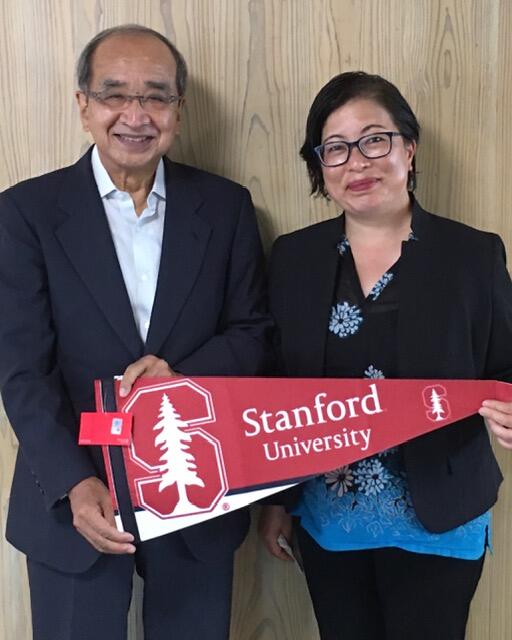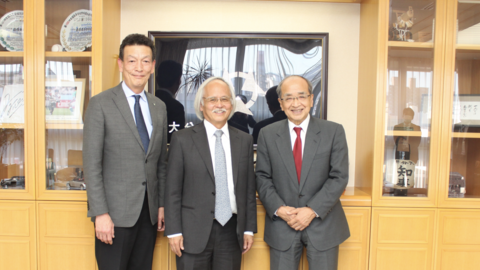Stanford e-Fukuoka Students Learn to Connect the Dots in U.S.–Japan Relations
With start-up companies and cafes popping up throughout the city, it’s no wonder that Fukuoka is called the Silicon Valley of Japan. Meiji era schoolhouses and red-brick buildings that housed insurance companies a century ago are now being turned into start-up cafes for entrepreneurs and community cultural centers. In November 2023, the city even began offering foreign entrepreneurs a “startup visa” that allows them to stay in Japan for up to a year to help launch their businesses.
During my visit to Fukuoka in November 2023, I wasn’t surprised to learn that Fukuoka Governor Seitaro Hattori had just returned from Boston where he and his delegation—representing governmental, corporate, academic, and emerging sectors—met with Massachusetts Governor Maura Healey, hosted a pitch event for entrepreneurs, visited MIT, and promoted Fukuoka’s famous Yame green tea in New York City.
Governor Hattori (photo below) joined Stanford e-Fukuoka’s closing ceremony at the prefectural government office on a crisp November day, as U.S. and Japanese flags waved overhead. There, he addressed the 17 students who gathered from all corners of the prefecture and offered words of encouragement for their participation in the six-month course. He remarked, “Through your participation in Stanford e-Fukuoka, you have been able to experience things that can’t be learned or experienced in a regular classroom. As we confront challenging global issues and conflicts, I hope we can overcome them by holding onto what is important. Do not let the fear of making mistakes hold you back from your pursuits.”

2022–23 Stanford e-Fukuoka honorees Rui Ogura (Chikushi Jogakuen Senior High School) and Ayumi Ryu (Kurume High School) shared their thoughts about the program and their recent visit to Stanford University in August 2023. Ogura stated, “I would like to express my sincere gratitude for giving me such a wonderful learning opportunity. Although the lecture content was extremely difficult for me, I was inspired by the high English language proficiency and proactive comments by my classmates. It made me want to work even harder.”
In her presentation at Stanford, Ogura suggested ways to rebuild a sustainable society in present-day Fukuoka based on the eco-friendly lifestyle of the Edo period. Ogura added, “Through the six-month-long Stanford e-Fukuoka program, I reaffirmed the importance of ‘staying curious.’ Kasumi-sensei encouraged me to keep asking questions. In addition to preparing for the lectures, I was asked to think about my research and presentation from many perspectives. As I prepared for my presentation, I received new questions every few days. Answering them made me reflect on my ideas from different angles.”
Ryu also shared her thoughts on the course. “There are many things that I gained through this course, but the two main ones are meeting diverse people and seeing things from multiple perspectives. By asking questions during lectures, sharing my own thoughts with guest speakers, and having discussions with other high school students, I not only learned about leadership but also learned about fellowship.”
At Stanford, Ryu presented on ways to create a sustainable food supply for residents of her hometown of Miyama City through the revitalization of akiya (abandoned buildings). Ryu added, “I learned how to think about social issues and how they are related to history. Through the class, I was able to think about solutions from new perspectives and used English in a practical way. I became more interested in social issues such as food systems and the preservation of historic buildings and enjoyed learning about the diverse backgrounds of each guest speaker. Stanford e-Fukuoka made me reconsider my vision for the future.”
This year, we welcomed guest speakers including Julie Wurfel, a Silicon Valley sustainable food entrepreneur; Erika Enomoto, an arts enthusiast and Product Manager at Microsoft; and Jan Johnson, the owner of Seattle’s Panama Hotel, a National Historic Landmark built in 1910 and steeped in Japanese American history. Students from Fukuoka also had a chance to exchange ideas with peers in the United States when they met Japanese language students from the Bronx High School of Science (my alma mater) online. Students from both countries enjoyed discussing a range of topics from anime and J-pop to differences in high school and college experiences in the United States and Japan. Many shared their mutual aspirations to study abroad in the future.
Stanford e-Fukuoka student Kokomi Wakizono (Fukuoka Futaba Senior High School) noted how it was not only students overseas but those nearby with whom she was able to connect. “Stanford e-Fukuoka was an amazing chance for me to learn how Fukuoka and Japan are connected to the United States. This program gave me an opportunity to meet different people, my age, with similar interests and ideas. It was also the first time that I connected with people in Kitakyushu and Kurume even though we live in the same prefecture. I was so surprised to see how we are so connected!” Izumi Matsumura (Nakamura Jogakuen High School) added, “This class made me realize that it’s not only important to learn about our own areas of interest. We need to think about how it might be related to something or someone else. I feel motivated to study various fields and find connections from a broader perspective. Just as Steve Jobs said, we need to ‘connect the dots.’”
A highlight in 2023 was when we were joined by renowned poet, educator, feminist, and human rights activist, Mitsuye Yamada, who was born in Fukuoka and emigrated to Seattle as a child. She shared stories of her youth, her family, and wartime incarceration in Minidoka. Stanford e-Fukuoka students flooded her with happy birthday wishes a few weeks before her 100th birthday. Yamada was delighted and shared her enthusiasm for lifelong learning and said, “We’re never too old to learn and share what we’ve learned.” With this thought in mind, I look forward to welcoming my students to the third year of Stanford e-Fukuoka in 2024.
Stanford e-Fukuoka was launched in Spring 2022 and is made possible through a partnership between Stanford University, the U.S. Consulate Fukuoka, and the Fukuoka Prefectural Government. I would like to extend my gratitude to the Honorable Seitaro Hattori (Governor, Fukuoka Prefecture), the Honorable Shankar D. Rao (Consul, U.S. Consulate Fukuoka), Chie Inuzuka (Director, Fukuoka American Center), and Kyoko Tomita (Teacher’s Consultant, Senior High Education Division, Fukuoka Prefectural Board of Education) for their collaboration and support in making Stanford e-Fukuoka possible. This course offers students throughout the prefecture with an opportunity to learn about U.S.–Japan relations, Sustainable Development Goals (SDGs), and entrepreneurship. Stanford e-Fukuoka is one of SPICE’s local student programs in Japan.
Read More

Instructor Kasumi Yamashita reflects on the Stanford e-Fukuoka Program, which recently concluded its second session.

 FSI researchers strive to understand how countries relate to one another, and what policies are needed to achieve global stability and prosperity. International relations experts focus on the challenging U.S.-Russian relationship, the alliance between the U.S. and Japan and the limitations of America’s counterinsurgency strategy in Afghanistan.
FSI researchers strive to understand how countries relate to one another, and what policies are needed to achieve global stability and prosperity. International relations experts focus on the challenging U.S.-Russian relationship, the alliance between the U.S. and Japan and the limitations of America’s counterinsurgency strategy in Afghanistan.


















